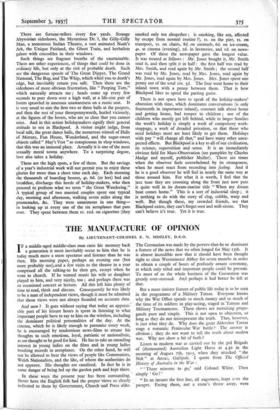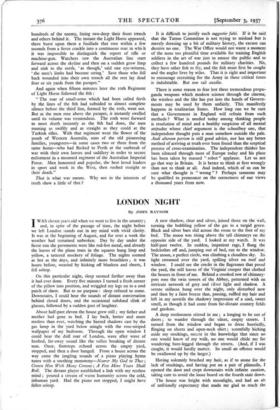THE MANUFACTURE OF OPINION
By LIEUTENANT-COLONEL E. N. MOZLEY, D.S.O.
IF a middle-aged middle-class man casts his memory back a generation it must inevitably occur to him that he is today much more a mere spectator and listener than he was then. His morning paper, perhaps an evening one (but more probably not), and a few visits to the theatre in a year comprised all the talking-to he then got, except when he went to church. If he wanted music his wife or daughter played to him, and very nicely, too ; and perhaps there was an occasional concert or lecture. All this left him plenty of time to read, think and discuss. Consequently he was likely to be a man of independent views, though it must be admitted that those views were not always founded on accurate data.
And now ? It goes without saying that today an appreci-' able part of his leisure hours is spent in listening to what important people have to say to him on the wireless, including the dominant political personalities of the day. At the cinema, which he is likely enough to patronise every week, he is encouraged by tendentious news-films to attune his thoughts to such emotions, loyal, patriotic or nationalistic, as are thought to be good for him. He has to take an unending interest in young ladies on the films and in young ladies breaking records in aeroplanes. On the other hand, he will not be allowed to hear the views of people like Communists, Welsh Nationalists, and the like, of whom the authorities do not approve. His thoughts are canalised. In fact he is in some danger of being led up the garden path and kept there.
In these ways the present year has 'been outstanding. Never have the English folk had the proper views so clearly indicated to them by Government, Church and Press alike. The Coronation was made by the powers-that-be so dominant a feature of the news that we often longed for May 13th. It is almost incredible now that it should have been thought right to close Westminster Abbey for seven months in order to obtain a couple of hours of profusely ornate ceremony; at which only titled and important people could be present. To most of us the whole business of the Coronation was greatly over-stressed. And perhaps it had better be left at that.
But a more sinister feature of public life today is to be seen in the programme of a Military Tattoo. Everyone knows why the War Office spends so much money and so much of the time of its soldiers in play-acting, staged in-Tattoos and Military Tournaments. These shows are recruiting propa- ganda pure and simple. This is not open to objection, so long as they do not misrepresent the truth. That, however, is just what they do. Why does the great Aldershot Tattoo stage a romantic Peninsular War battle ? The answer is obvious ; they do not want to tell the truth about modern war. Why not show a bit of both ?
Listen to modern war as carried out by the 3rd Brigade of (dismounted) Australian Light Horse at 4.3o in the morning of August 7th, 1915, when they attacked " the Nek " at Anzac, Gallipoli. I quote from The Official History of Australia in the War : " ' Three minutes to go,' said Colonel White. Then simply ' Go ! '
" In an instant the first line, all eagerness, leapt over the parapet. Facing them, not a stone's throw away, were hundreds, of the enemy, lining two-deep their front trench and others behind it. The instant the Light Horse appeared, there burst upon them a fusillade that rose within a few seconds from a fierce crackle into a continuous roar in whit h it was impossible to distinguish the report of rifle or machine-gun. Watchers saw the Australian line start forward across the skyline and then on a sudden grow limp and sink to the earth, ' as though,' said one eye-witness, ' the men's limbs had become string.' Save those who fell back wounded into their own trench all the rest lay dead four or six yards from the parapet."
And again when fifteen minutes later the loth Regiment of Light Horse followed the 8th : " The roar of small-arms which had been called forth by the lines of the 8th had subsided to almost complete silence before the third line, formed by the loth, went out. But as the men rose above the parapet, it instantly swelled until its volume was tremendous. The loth went forward to meet death instantly as the 8th had done, the men running as swiftly and as straight as they could at the Turkish rifles. With that regiment went the flower of the youth of Western Australia, sons of the old pioneering families, youngsters—in some cases two or three from the same home—who had flocked to Perth at the outbreak of war with their own horses and saddlery in order to secure enlistment in a mounted regiment of the Australian Imperial Force. Men honoured and popular, the best loved leaders in sport and work in the West, then rushed straight to their death."
That is what war means. Why not in the interests of truth show a little of that ? It is difficult to justify such suggestio falsi. If it be said that the Tattoo Committee is not trying to mislead but is merely dressing up a bit of military history, the excuse can deceive no one. The War Office would not waste a moment of the none too plentiful time available for training English soldiers in the art of war just to amuse the public and to collect a few hundred pounds for military charities. No, they have other fish to fry, and the fish must first be caught and the angler lives by wiles. That it is right and important to encourage recruiting for the Army in these critical times is indubitable. But non tali auxilio.
There is some reason to fear lest these tremendous propa- ganda weapons which modern science through the cinema, the wireless and the like has put into the hands of Govern- ments may be used by them unfairly. This manifestly happens in totalitarian States. How long can we be sure that a Government in England will refrain from such methods ? What is needed today among thinking people is resolution of mind and a healthy suspicion of all mental attitudes whose chief argument is the schoolboy one, that independent thought puts a man somehow outside the pale. Audi alteram portent is still good advice, nor has any better method of arriving at truth ever been found than the sceptical process of cross-examination. The independent thinker has been silenced through most of Europe today and his place has been taken by massed " robot " applause. Let us not go that way in Britain. It is better to think at first wrongly than not to think at all. And indeed, which of us can be sure what thought is " wrong " ? Perhaps someone may be qualified to pronounce on the correctness of our views a thousand years from now.











































 Previous page
Previous page